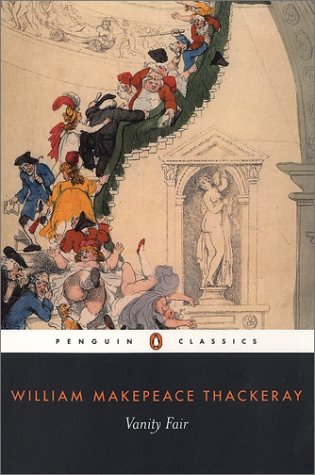
Country: United Kingdom
Genre: Literary/Historical Fiction
Pages: 743
Vanity Fair is a zeitgeist novel. According to the American Heritage Dictionary of the English Language, it's supposed to catch "the spirit of the age". The cultural, intellectual, ethical and political climate within a name or a given group, along with the general ambiance, morals, sociocultural direction and mood associated with the era. Long definition, I know. It almost justifies the use of savant compound words such as zeitgeist. Vanity Fair and its writer William Makepeace Thackeray wear this qualifier with the utmost pride, like a title of nobility. Like most novels written with Academic acceptance in mind, it makes a terrific point, but it's lacking the appeal of engaging characters or of any sort of storyline.
If you ever decide to give Vanity Fair a run, I'm warning you. Do not look for any sort of narrative or you're going to lose your goddamn mind. It's the chronicle of the collapse of a social structure. It begins with the friendship between Becky Sharp, a penniless, but strong willed and deceiful young girl and Amelia Sedley, a happy-go-lucky blue-blooded girl who doesn't grasp what her friend has to cope with to keep up with her. Thackeray articulates his novel around the volatile friendship in between the two woman. They will get married for different reasons, Becky taking for husband her boss' son in order to better her social condition, but the Napoleonic Wars will level the playing field in between the two women. The chaos on the battle field will reflect on the English society and Becky will make the most of that scramble. From there, endless social bickering ensues for more than two hundred pages.
Let's put things in perspective. Vanity Fair was an episodic novel, written in a newspaper for more than a year. Thackeray's concern was to keep his reader's attention from chapter to chapter, rather than building something that made sense from A to Z. I can forgive a little lack of structure, because it's a novel that carries a very good point over time. The rise of market economy and the porousness of the borders it brought along (OK, maybe it was also helped by war), has torn down an institution and a way of thinking. Becky proves the point that having a "good birth" and casting yourself in it will put you to the mercy of the more interested person who will take the necessary risks to take control. Vanity Fair does a good job at capturing the zeitgeist of a troubled era and at illustrating what brought mankind to change. It's portrayed in a somewhat nihilistic fashion, characters are evil or dumb, but it has that feeling of free-for-all.
But like any writer who likes the sound of their voice too much, Thackeray gets carried away with his own importance. By the time war is over and that Becky gets on top of her game, there's one third of he novel left to go. A third so painful that it made me want to thumb myself in the eye repeatedly. Vanity Fair hammers and hammers the same points constantly, like a television show that went one season too far. Maybe that's a part of the problem though. Maybe it's been written for people who didn't know cinema's capacity of synthesis, that didn't have television, internet or Powerpoint. There's a reason why books grew thinner over the 20th century, our capacity of focus did so. In that case, it's a novel that didn't age very well, unless you're super-interested in knowing how the British empire fell, from a micro-managing point of view. Then it keeps an Historical value.
I finished Vanity Fair in ten days and I was never that happy to finish a novel since I've read Marquis de Sade's 120 Days Of Sodom. Other nineteenth century novels have aged a lot better, and even if you're in that whole courting, dresses, balls, swords, tights and tea kind of deal, I think you can tiptoe around Vanity Fair without any problem and still consider yourself a good reader. In fact, there are so many good books around (of that era alone), I'm not sure I can give you a good reason to read it. I'm proofreading my own review and I'm boring myself, even when I touch to Thackeray's pertinence. Cinema has constrains of brevity that Thackeray didn't have to bother with, so I will encourage you to watch the many movie versions instead.
If you ever decide to give Vanity Fair a run, I'm warning you. Do not look for any sort of narrative or you're going to lose your goddamn mind. It's the chronicle of the collapse of a social structure. It begins with the friendship between Becky Sharp, a penniless, but strong willed and deceiful young girl and Amelia Sedley, a happy-go-lucky blue-blooded girl who doesn't grasp what her friend has to cope with to keep up with her. Thackeray articulates his novel around the volatile friendship in between the two woman. They will get married for different reasons, Becky taking for husband her boss' son in order to better her social condition, but the Napoleonic Wars will level the playing field in between the two women. The chaos on the battle field will reflect on the English society and Becky will make the most of that scramble. From there, endless social bickering ensues for more than two hundred pages.
Let's put things in perspective. Vanity Fair was an episodic novel, written in a newspaper for more than a year. Thackeray's concern was to keep his reader's attention from chapter to chapter, rather than building something that made sense from A to Z. I can forgive a little lack of structure, because it's a novel that carries a very good point over time. The rise of market economy and the porousness of the borders it brought along (OK, maybe it was also helped by war), has torn down an institution and a way of thinking. Becky proves the point that having a "good birth" and casting yourself in it will put you to the mercy of the more interested person who will take the necessary risks to take control. Vanity Fair does a good job at capturing the zeitgeist of a troubled era and at illustrating what brought mankind to change. It's portrayed in a somewhat nihilistic fashion, characters are evil or dumb, but it has that feeling of free-for-all.
But like any writer who likes the sound of their voice too much, Thackeray gets carried away with his own importance. By the time war is over and that Becky gets on top of her game, there's one third of he novel left to go. A third so painful that it made me want to thumb myself in the eye repeatedly. Vanity Fair hammers and hammers the same points constantly, like a television show that went one season too far. Maybe that's a part of the problem though. Maybe it's been written for people who didn't know cinema's capacity of synthesis, that didn't have television, internet or Powerpoint. There's a reason why books grew thinner over the 20th century, our capacity of focus did so. In that case, it's a novel that didn't age very well, unless you're super-interested in knowing how the British empire fell, from a micro-managing point of view. Then it keeps an Historical value.
I finished Vanity Fair in ten days and I was never that happy to finish a novel since I've read Marquis de Sade's 120 Days Of Sodom. Other nineteenth century novels have aged a lot better, and even if you're in that whole courting, dresses, balls, swords, tights and tea kind of deal, I think you can tiptoe around Vanity Fair without any problem and still consider yourself a good reader. In fact, there are so many good books around (of that era alone), I'm not sure I can give you a good reason to read it. I'm proofreading my own review and I'm boring myself, even when I touch to Thackeray's pertinence. Cinema has constrains of brevity that Thackeray didn't have to bother with, so I will encourage you to watch the many movie versions instead.

